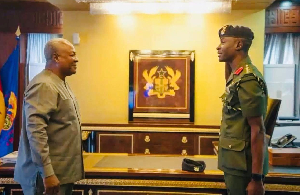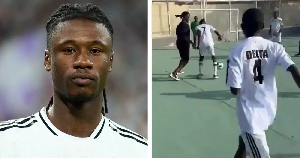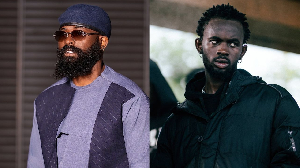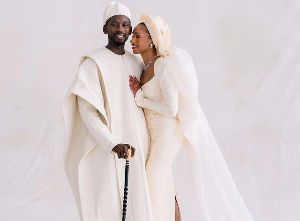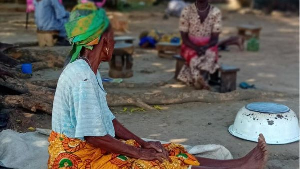8th September 2013
Why the case of the petitioners ‘succeeded’ by a 5:4 majority
By Gabby Asare Otchere-Darko
On Monday, September 16, 2013, the Danquah Institute, in partnership with other civil society groups will hold a symposium at the British Council for jurists and other legal and statistics experts to critique the decision of the Supreme Court in the presidential election petition filed by Nana Akufo-Addo and two others against the election of President John Mahama in the December 2012 election.
But, last week, as a panellist on two separate current affairs programmes on radio (Oman FM and Joy FM), I provoked an argument, which will be one of the topics that the legal and analytical minds will delve into at the upcoming symposium.
I stated that, going by the reliefs sought by the petitioners and the issues set for determination by the Supreme Court, as the trial court of facts, it is difficult to not describe as perverse the conclusion of the presiding judge, when announcing the decision on August 29, 2013, that, “[i]n the circumstances, the overall (net) effect is that the first respondent was validly elected and the petition is, therefore, dismissed.”
In fact, the Court could not say expressly upon which actual majority the final decision was reached. It chose rather conveniently to sidestep its own issues for determination to do a vote count on the six main categories of infractions from which the petitioners extracted their evidence.
It was as if the Court’s main duty was to uphold the presidency of John Mahama rather than to uphold the Constitution of the Republic. The 1992 Constitution sets out the judicial oath, which concludes, “I will at all times uphold, preserve, protect and defend the Constitution and laws of the Republic of Ghana.” This leads Justice Anin Yeboah to pose the question at page 472 of the judgment, “if a court of law does not give effect to the law, who will.”
Again, US Supreme Court judge, Justice Benjamin Curtis, dissenting in Dred Scott, warned the country against letting judges make up new constitutional provisions, in these famous words: “When a strict interpretation of the Constitution, according to the fixed rules which govern the interpretation of laws, is abandoned, and the theoretical opinions of individuals are allowed to control its meaning, we have no longer a Constitution; we are under the government of individual men, who for the time being have power to declare what the Constitution is, according to their own views of what it ought to mean.” Dred Scott was an African-American slave who unsuccessfully sued for his freedom and that of his wife and their two daughters in the Dred Scott v Sandford case of 1857.
Reading superficially from what the Court read on 29th August, the general conclusion has been that it was a 5:4 majority decision that John Mahama was validly elected.
My view, however, is that the decision, in both fact and law, is a 5:4 majority that John Mahama was not validly elected. This is because five justices, Julius Ansah, Rose Owusu, Jones Dotse, Anin Yeboah, and Baffoe Bonnie, all held that the irregularities found were enough to affect the results and that there should be a second election but in the affected areas. Significantly, they were willing to uphold the law but without totally disenfranchising the voters affected.
To paraphrase Justice Atuguba’s words, the “net effect” of the majority of the bench was that the December 2012 presidential election did not satisfy the requirement in Article 63(3) of the Constitution of the Republic that “A person shall not be elected as President of Ghana unless at the presidential election the number of votes cast in his favour is more than fifty per cent of the total number of valid votes cast at the election.”
The five judges, who found for the petitioners, based their decision on three of the six main categories, namely over-voting, voting without biometric verification and absence of presiding officers’ signatures. Four of them always agreed on each of the three categories of infractions.
Equally instructively, such were the number of polling stations involved, over 4,000, that finding for the petitioners on any one of the three categories would lead to no candidate winning the December 2012 presidential contest. Also, granting any two of the three could mean that the residue of valid votes cast pointed to the first petitioner as the validly elected president.
Notwithstanding the fact that all five justices concluded that John Mahama was not validly elected, they fell short of declaring Akufo-Addo as validly elected, opting instead for a second election in the affected areas. So, the question is, why did the Court not order a rerun as concluded emphatically by five members of the nine-member panel?
So how come the Court concluded that John Mahama was rather the one who was validly elected? How the Court sought to go around invalidating the said election and upholding the disputed declaration of 9th December, 2012, was to introduce a new issue altogether on the day of judgment. This was that the petitioners must get a majority of judges agreeing, not just that there were infractions, but, more materially, on each category of infraction.
There were 6 categories of infractions, and the petitioners case was that there were a lot more instances where multiple infractions affected the results from the same polling stations, further leading to 24 sub-categorisations in order to avoid double-counting.
At page 79 of the address of counsel for the petitioners, Mr Philip Addison pointed out to the Court that the case of the petitioners was not based on ‘categorisation’ or categories of infractions but rather on the occurrence of infractions affecting the results at the various polling stations. He said, “the purpose of breaking down the categories into 24 was simply to avoid double-counting. To say that the petitioners’ case is based on categorisation rather than violations/infractions is to misunderstand entirely the case of the petitioners, which is based not on categories of infractions but on violations or infractions on the face of the pink sheet.”
The Two Median Justices, Dotse and Baffoe Bonnie
The rational behind this can be situated in the opinions of the two seemingly median justices, Dotse and Baffoe Bonnie. Both of them found enough evidence to conclude that John Mahama was not validly elected. However, because their findings managed to avoid each other’s findings, the petitioners were denied a majority on any of the three infractions that were eventually in issue. But, should that have been the materially occupation of a court determined to grant substantial justice in a matter of such national substance?
Justice Dotse found for the petitioners on over-voting and absence of presiding officers’ signatures. Justice Baffoe Bonnie granted voting without biometric verification. He also found for over-voting, but by some never-explained analysis, concluded that the votes involved were not enough to affect the results! Nevertheless, the two justices joined the three other justices, Ansah, Owusu and Anin Yeboah, to find for the petitioners on all three categories, and the weight of the combined evidence in the three categories was more than enough to bring John Mahama squarely below the scale of validity as constitutionally required.
The total votes to be cancelled under voting without biometric verification were 816,866, with 560,399 coming out of John Mahama’s votes and 234,970 coming out of Akufo-Addo’s, leaving the two candidates neck-and-neck on 49.25% each on the residue of valid votes cast.
Even though justices Dotse and Baffoe Bonnie did not meet on any of the three categories, the two judges invariably found themselves meeting where it matters most, the polling stations where the said infractions took place. This is due to several instances of multiple violations found on the same pink sheet.
Per my initial analysis, the infractions accepted by the two justices emerged in a merged form in 715 polling stations, where on the particular same pink sheets the two justices joined the other three in finding that voting without biometric verification took place along side over-voting and/or absence of presiding officers signatures. Some 282,998 votes are involved, clearly having a material effect on the results declared.
The basis of my argument is pretty obvious. By their second amended petition of 8th February 2013, the petitioners sought the following reliefs:-
“(1) that John Dramani Mahama, the 1st respondent herein, was not validly elected President of the Republic of Ghana;
(2) that Nana Addo Dankwa Akufo-Addo, the 1st petitioner herein, rather was validly elected President of the Republic of Ghana;
(3) consequential orders as to this Court may seem meet.”
ISSUES FOR DETERMINATION
The Supreme Court set down two issues for trial as follows: “(1) Whether there were violations, omissions, malpractices and irregularities ?of the Presidential election held on 7th and 8th December 2012 and (2) Whether or not the said violations, omissions, malpractices and irregularities, if any, affected the outcome of the results of the elections.”
In the opinion of four of the justices, Atuguba, Adinyira, Gbadegbe and Akoto-Bamfo, there were either no violation at all or that the violations found were not enough to affect the results declared by the Electoral Commission. Instructively, the three justices did not always agree on how they came to the conclusion that the 1st respondent, John Mahama, was validly elected. Thus, with the exception of absence of presiding officers’ signatures, they were able to legally come to the conclusion of validity of John Mahama’s presidency through separate routes. It seems that, the matter of utmost paramountcy to the Court was that all four agreed on their conclusion on the first relief of the petitioners.
For example, Justice Atuguba accepted over-voting and voting without biometric verification “to the limited extent admitted by the Electoral Commission’s Chairman, which cannot impact much on the declared results.” That was not the opinion of the other three. Indeed, Justice Gbadegbe, for instance, based the thrust of his conclusion on over-voting on his opinion that there is an arithmetical error in the format of the ballot accounting section of the pink sheet, thereby, rendering it unreliable! On voting without biometric verification, he concluded that the pink sheet was not the “primary evidence” and that the “petitioners ought to have shown that the better or best evidence to which they relate are not available.” That evidence, the biometric verification device, is in the lawful custody of the EC, which refused to tender it!
In the same way, the five justices who granted the first relief of the petitioners did not always agree on the type of infractions that led each of them to the conclusion that John Mahama was not validly elected.
So, why should the justices who held that the 1st respondent was validly elected be free to arrive at their conclusion from disagreeable pathways and the same be denied of those who found for the petitioners?
I reproduce below from the 588-page judgment the relevant concluding opinions of the five justices who held that John Mahama was not validly elected:
Justice Julius Ansah
“The foregoing evaluation of the impact of the nullified votes shows that they resulted in neither the first petitioner nor the first respondent obtaining the critical fifty percent plus one valid vote threshold. As neither the first petitioner nor the first respondent had the required number of votes by the constitution to be declared the President of the Republic of Ghana, I make the following conclusions and directions:
1. That the relief that and declaration be made that Mr. John Dramani Mahama was not validly elected the President of Ghana, is hereby granted;
2. That a declaration be made that Nana Akufo-Addo be declared the candidate who was validly elected the President of Ghana, is also refused.
3. The consequential order I make is that the E.C. conducts a re-run of the Presidential elections for the two leading candidates, Mr. John Dramani Mahama and Nana Akufo-Addo, in all the polling stations affected and indicated in the petition and its supporting documents, forthwith. (SGD) J. ANSAH?JUSTICE OF THE SUPREME COURT”
Justice Rose Owusu
“The number of votes annulled for the three irregularities and violations of over voting, voting without Biometric verification will negatively impact on the result declared by the 2nd Respondent having regard to the votes margin between the 1st petitioner and the 1st Respondent. If the invalid votes are deducted from the votes of the two, the 1st Respondent who was declared winner on 50.7% of the votes cast will not cross the threshold of 50%+1. For this reason, I will and hereby declare that the 1st Respondent was not validly declared winner of the 2012 presidential election. The first relief of the petitioners is hereby granted.
“The 2nd relief for a Declaration that Nana Addo Dankwa Akufo-Addo, the 1st petitioner herein, rather was validly elected President of the Republic of Ghana cannot be granted because of the order for re-running the election in polling stations where the votes are to be annulled. The 3rd relief has been granted in the polling stations where the election is to be re-run. The petition succeeds in part. (SGD) R. C. OWUSU (MS)?JUSTICE OF THE SUPREME COURT.”
Justice J V Dotse
“Having reviewed the entire pleadings and the evidence in this case, there is absolutely no doubt in my mind that there have been some violations, omissions, malpractices and irregularities of the Presidential elections held on the 7th and 8th December 2012. What must be noted is that, even though these infractions were not proven to have been orchestrated by either the 1st or 3rd Respondents, but by the agents of the 2nd respondents, once they are infractions which have been established in some instances, I will uphold them. This is pursuant to powers conferred on this Court under article 64 (1) and (2) of the Constitution, 1992.
“The resolution of the second issue is somewhat difficult to resolve. This is because, it has to be determined whether these violations, omissions etc, affected the outcome of the results. The petitioner’s relief one will therefore be granted in respect of the No Presiding Officer Signature Category in terms of my decision as is contained in the main body of the judgment.
Similarly, the petitioners would be deemed to be successful in respect of their relief one in the over-voting category in terms as shall be determined using the road map as indicated in the main body of the judgment during the audit of the affected pink sheets. Relief two is, however, accordingly dismissed.”
Justice Anin Yeboah
“I do not think that from the evidence of the petitioners, both documentary and oral, any one would doubt that the petitioners failed to prove multiple irregularities, malpractices and statutory violations against the second defendant. I am of the firm conviction that issue (1) was proved to my satisfaction by the available evidence on record and I accordingly proceed to resolve same in favour of the petitioners. On Issue (2), I find from the evidence that given the number of votes affected by the violations, omissions and malpractices and the irregularities appear to be such that they impacted adversely on the results, I would also resolve issue (2) in favour of the petitioners.
“I would have readily proceeded to grant the reliefs sought in its entirety but the ONLY problem is that from the available evidence, the widespread violations, omissions and malpractices appeared to be of such proportions that it would not be proper for me to declare the first petitioner as winner of the elections in controversy in terms of the reliefs sought. I find the malpractices, omissions and violations enormous which rock the very foundation of free and fair elections as enshrined in our constitution which was itself breached through over-voting, lack of presiding officer's signature and lack of biometric verification which takes its validity from Article 5l of the very constitution.
“I would therefore grant the relief (i) in view of the evidence led and decline to grant relief (ii). I, however, as consequential order, order the second respondent to organize an election to elect a president as I cannot rely on an election which was seriously fraught with all the malpractices, irregularities and statutory violations proved in this petition to declare the first petitioner as having been duly elected.”
Finally, Justice Baffoe-Bonnie
“I uphold the principle that once over-voting is detected in a polling station the elections there are compromised and should be cancelled but the voters there should be given a second chance to cast their votes. However I find that in view of the admissions made by the 2nd petitioner with regard to some pink sheets and the many clerical errors, I find that the number of pink sheets affected in this category has so reduced that they votes affected are not too significant to make any impact even if they are cancelled. I dismiss the claim on this ground too.
“I hold that the petitioners have discharged the burden of proof on them that voting took place in some polling stations without prior biometric verification. This was discriminatory since other persons had been turned away for their inability to be verified. All those stations affected by this phenomenon should have their votes cancelled and the voters given a second chance to vote again. (SGD) P. BAFFOE BONNIE.”
Now, we may all need some further education as to how this same Court could conclude that, “[i]n the circumstances, the overall effect is that the first respondent was validly elected and the petition is, therefore, dismissed.” Perhaps we can find answers in dictum of Justice William Atuguba, the presiding judge, at page 40 of the judgment: For starters, I would state that the Judiciary in Ghana, like its counterparts in other jurisdictions, does not readily invalidate a pubic election, but often strives in the public interest, to sustain it.”
When judges who are called upon to apply the law prefer to arrogate to themselves the Godly or scientific authority to determine what the Ghanaian public see to be in their interest, then we can only say, God help us.
Join us at the British Council Hall, on Monday, 16th September, 2013, to hear what the various experts have to say. For more information contact: info@danquahinstitute.org
Opinions of Thursday, 12 September 2013
Columnist: Otchere-Darko, Gabby Asare


